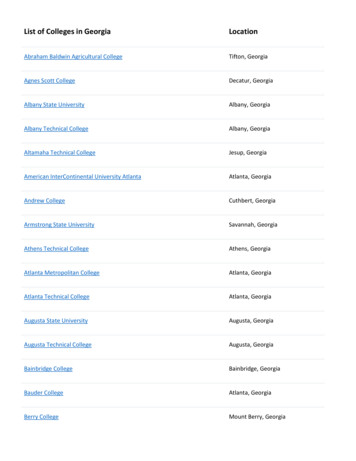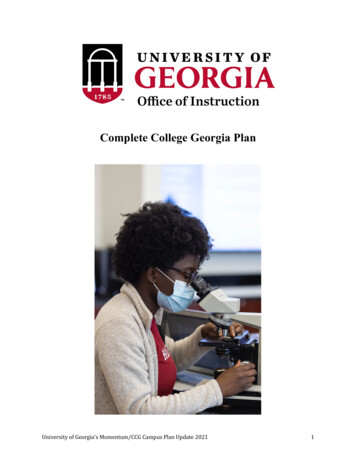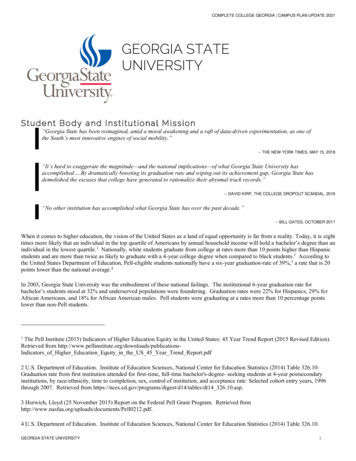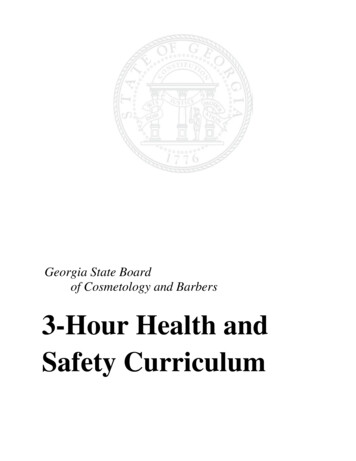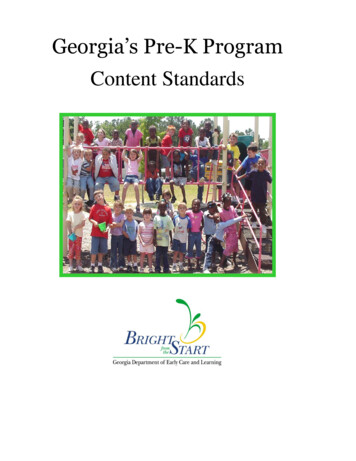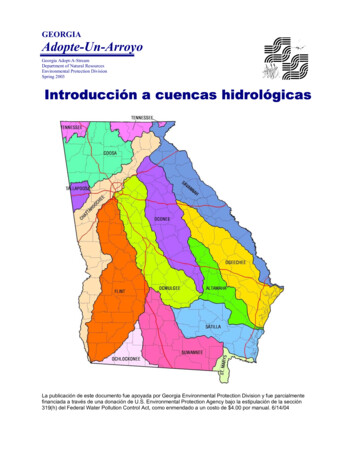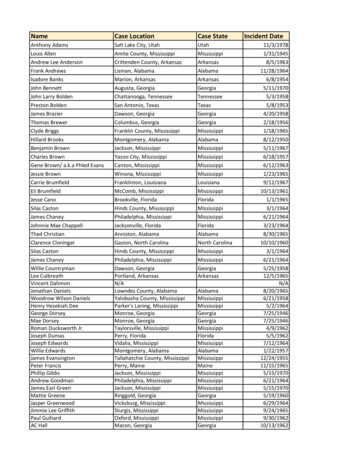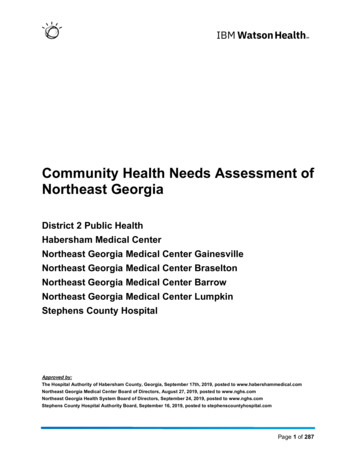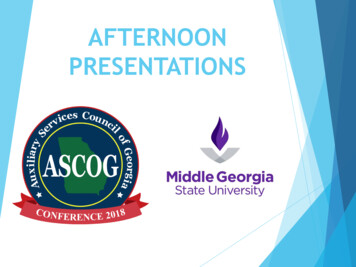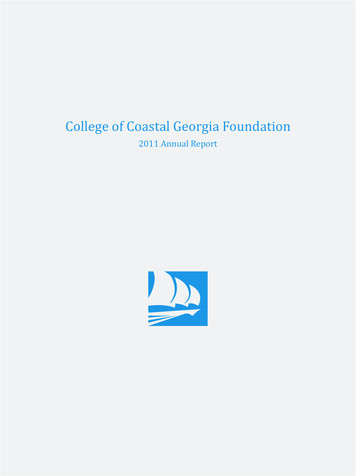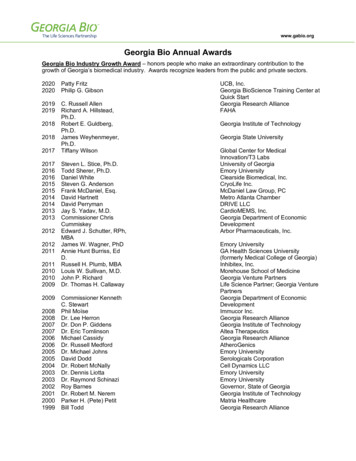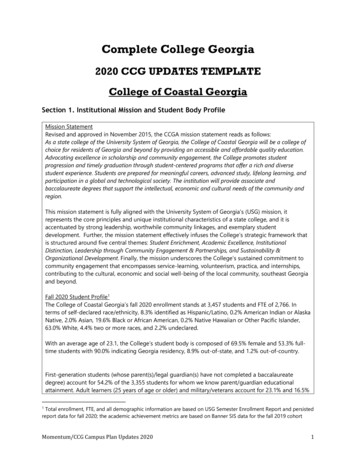
Transcription
Complete College Georgia2020 CCG UPDATES TEMPLATECollege of Coastal GeorgiaSection 1. Institutional Mission and Student Body ProfileMission StatementRevised and approved in November 2015, the CCGA mission statement reads as follows:As a state college of the University System of Georgia, the College of Coastal Georgia will be a college ofchoice for residents of Georgia and beyond by providing an accessible and affordable quality education.Advocating excellence in scholarship and community engagement, the College promotes studentprogression and timely graduation through student-centered programs that offer a rich and diversestudent experience. Students are prepared for meaningful careers, advanced study, lifelong learning, andparticipation in a global and technological society. The institution will provide associate andbaccalaureate degrees that support the intellectual, economic and cultural needs of the community andregion.This mission statement is fully aligned with the University System of Georgia’s (USG) mission, itrepresents the core principles and unique institutional characteristics of a state college, and it isaccentuated by strong leadership, worthwhile community linkages, and exemplary studentdevelopment. Further, the mission statement effectively infuses the College’s strategic framework thatis structured around five central themes: Student Enrichment, Academic Excellence, InstitutionalDistinction, Leadership through Community Engagement & Partnerships, and Sustainability &Organizational Development. Finally, the mission underscores the College’s sustained commitment tocommunity engagement that encompasses service-learning, volunteerism, practica, and internships,contributing to the cultural, economic and social well-being of the local community, southeast Georgiaand beyond.Fall 2020 Student Profile1The College of Coastal Georgia’s fall 2020 enrollment stands at 3,457 students and FTE of 2,766. Interms of self-declared race/ethnicity, 8.3% identified as Hispanic/Latino, 0.2% American Indian or AlaskaNative, 2.0% Asian, 19.6% Black or African American, 0.2% Native Hawaiian or Other Pacific Islander,63.0% White, 4.4% two or more races, and 2.2% undeclared.With an average age of 23.1, the College’s student body is composed of 69.5% female and 53.3% fulltime students with 90.0% indicating Georgia residency, 8.9% out-of-state, and 1.2% out-of-country.First-generation students (whose parent(s)/legal guardian(s) have not completed a baccalaureatedegree) account for 54.2% of the 3,355 students for whom we know parent/guardian educationalattainment. Adult learners (25 years of age or older) and military/veterans account for 23.1% and 16.5%Total enrollment, FTE, and all demographic information are based on USG Semester Enrollment Report and persistedreport data for fall 2020; the academic achievement metrics are based on Banner SIS data for the fall 2019 cohort1Momentum/CCG Campus Plan Updates 20201
of the total student body, respectively. Pell recipients account for 34.5% of students, while dualenrolled students total 443, or a 2.9% decrease compared to fall 2019. Academically, the class of newfreshman (for fall 2019) came to the institution with a 3.07 average high school GPA, attempted anaverage of 25.55 hours during the first academic year, earning an average of 20.1 credits. This cohortpersisted through fall 2020 at a 58.3% rate and had an average GPA of 2.5. The work on completion isimperative as we continue to support this student population.Section 2: Improvement PracticesThe College continues to evaluate processes, procedures, and structural elements of the educationalenterprise to ensure that students are challenged in the classroom by the rigor of academics and notoutside by structural or motivational obstacles. As seen in the strategies identified in the next section,the institution is committed to improving the way in which we guide students through career andacademic advising, through active and accessible communication, and through support when they arestruggling academically.Planning and decision-making continues to be a collaborative effort between Academic Affairs, StudentAffairs & Enrollment Management, always supported by Business Affairs, and technologically agile anddata rich thanks to a strong Technology Services team. As evidenced by the composition of the StudentSuccess and Completion Team, the diversity of expertise and diversity of thought around the studentsuccess table, make the College of Coastal Georgia a strong advocate for every student every time.Retention and student success are priorities that are culturally embraced and are embedded in everyinstitutional endeavor, including performance reviews, annual reports and budget reviews. The data andmetrics of success are disaggregated to monitor the effectiveness in serving the diverse studentpopulation and the institution is actively addressing areas where equity gaps persist.Section 3. Momentum Update: Observations and Next StepsSection 3.1 Existing Momentum WorkMost of your ongoing CCG strategies should align with the Momentum framework. For each area ofMomentum (Purpose, Pathways and Mindset), provide a general overview and description of the workyour institution has undertaken this past year, the results or outcomes of this work, your long-term goalfor this strategy and any observations of lessons you have learned about this activity this year.In this section, reference your success strategies as they align with the Momentum Framework: PurposefulChoices, Transparent Pathways, Productive Academic Mindset. Specifically, we are hoping to learn whatstrategies and activities have been most and least effective in your context and why? Furthermore,describe how your institution has adjusted your completion activities over the past year and your plans forthe coming year, especially if some of this work will change in response to the COVID –19 pandemic.Purposeful ChoiceMomentum/CCG Campus Plan Updates 20202
Strategy or activityCOMPASS Career and Academic AdvisingSummary of Activities In alignment with the discussion during the Momentum Summit III and thesubsequent Momentum Approach Plan, the College has now created theCOMPASS Career and Academic Advising Center. This new office is theconsolidation of Career Services and Academic Advising and is now providing amore holistic approach to student development, where students are guided tostart with the end in mind and are supported throughout their collegeexperience.The College recognizes the impact that this strategy can have on student successand has selected “COMPASS: Integrated Career & Academic Planning” as thetopic for its next Quality Enhancement Plan (QEP). A committee with broadinstitutional representation has been appointed as the QEP DevelopmentCommittee, and has been charged to work during the 2020-2021 academic yearto develop an action plan for submission to SACSCOC.Outcomes/Measuresof progressSpecifically, through various webinars, professional development and one-onone training, Academic Advisors are becoming proficient COMPASS advisors.COMPASS Advisors work with freshmen in general advising, registration,academic support and intervention as well as have more detailed discussion withstudents about major/focus areas as it relates to career development. Inaddition, advisors have begun to work toward providing students with moreinformation about internships, service-learning and student engagementopportunities. Finally, advisors are working with faculty more closely toencourage more student interaction and to provide programs that are focusedon majors with a career path in mind, by visiting the introductory classes in eachmajor. COMPASS is also providing training to faculty advisors on best practicesfor advising.The institution has now established the consolidated office and is currently in thestage of aligning protocols and operational processes to support students underthe new paradigm.While Key Performance Indicators like retention and graduation rates are broadlythe measures of progress that we want to impact, there will be many preliminarymeasures as part of the implementation of the QEP and as the office startsinteracting with students. For the implementation stage we expect the QEPdevelopment committee to focus on accomplishing the following tasks: Research the QEP topic and refine student learning outcomes Identify actions needed to achieve the desired student learningoutcomes Consider the infrastructure necessary to implement and maintain theQEP Establish a timeline for accomplishing the plan Budget necessary resources to successfully carry out the QEP Develop an assessment plan Prepare submission documentationMomentum/CCG Campus Plan Updates 20203
Lessons Learned andPlans for the FutureChanges because ofCOVID-19As the office starts to interact with students to provide this holistic approach tocareer and academic planning we expect to track and measure the number ofclassroom presentations addressing purposeful choice and career planning, theaverage number of credits before declaring a major for those that are undeclaredwithin an academic focus area, the average number of changes of major perstudent, the number of freshman advising sessions, number of students engagedin academic improvement protocols, number of resume workshops, and thenumber of trainings and workshops developed and delivered to support facultyadvising.While this strategy is in its early stages, the institution is fully committed to itsdevelopment and implementation during the next few years.The two offices where in the process of consolidation as we experienced thetransition due to COVID-19. This transition impacted our ability to offer job fairsand graduate program fairs, and we have been relying on our online jobmanagement platform, Coastal Careerlink, to communicate job and careeropportunities. We initially planned to announce the new office in spring 2020,but the announcement was delayed until the start of fall 2020.This transition also impacted our ability to meet face-to-face with students soCOMPASS has increased the use of web-conferencing for individual meetingsand workshops. Employer Spotlights have replaced job fairs to ensure safedistancing.Transparent PathwaysStrategy or activityAlways Alert SystemSummary of Activities After its pilot in fall 2019 and at-scale implementation in spring 2020, the AlwaysAlert System now allows all faculty to report students that are in need ofacademic intervention at any point during the semester.This new system has two mechanisms to report students: An Early Alert Reportthat is completed for all students and all courses early in the term, and anAlways Alert Referral that can be done for an individual student at any pointthroughout the term.Outcomes/Measures The new system is a home-grown platform that seamlessly integrates with theof progressinstitutional portal and provides ease of access and reporting for all faculty asevidenced by the participation during the first at-scale implementation in spring2020 where 96% of the student population received early alerts (this includesgood standing reports) and where 341 referrals were submitted during the term.As we start fall 2020 this participation increased and 100% of the studentpopulation received early alerts and so far 282 referrals have been submittedthrough this system.It is important to note that the institution continues to implement homegrownand agile alternatives to expensive platforms and products. As an example, thisplatform is replacing GradesFirst, which the institution used a few years ago butproved not to be the right fit.Lessons Learned and One of the important lessons learned is that while the Early Alert Report is now aPlans for the Future mandatory practice, the Always Alert Referral is a process that starts with facultyMomentum/CCG Campus Plan Updates 20204
Changes because ofCOVID-19initiative, and the regular use of the platform is a clear indication that there wasan unmet need that is now being addressed by the system. As the platformcontinues to evolve, the institution is now working on improving the way inwhich the communication loop is closed; so far the information regarding thereport and the subsequent action to address the report are being documented inbanner, but we plan to create notifications that will let the initiator know whatwas the result of their report.While there are no changes associated to COVID-19, it is important to highlight,that the system has been used to react to student challenges associated with thepandemic. We believe this system improved communication between facultyand student support staff and that many of those communications would nothave occurred during the pandemic without this system in place.Strategy or activityImproved Communications through TechnologySummary of Activities The College has implemented several technology enhancements and newplatforms to improve communication with students. These improvements haveallowed students to get the information they seek faster and are allowing theCollege to take quicker action on student needs.Outcomes/Measures Student Portal “Mariner Success Crew” Feature. To increase the cohesivenessof progressof the College’s support services, every student is now connected with 5 supportstaff/faculty: A Career and Academic Advisor, a Financial Support Advisor, aTutoring and Academic Support Advisor, a Campus Life Advisor, and a FacultyAdvisor. Students can click on one of their advisors in this portal feature, whichwill connect them via email without having to open an email client. The email issent to the advisor (with cc to the student) who will receive an email from“Success Crew” with a subject line: “Success Crew question from [StudentName]”. The advisor’s reply will be sent directly to the advisee.From its launch at the end of March 2019 to September of 2020 the system hasconnected students with their various advisors in 3755 instances (2510connections during the last 12 months).Mariner Success CrewStudent/Advisor Connections per Month500450400350300250200150100500Mar Apr May Jun Jul Aug Sep Oct Nov Dec Jan Feb Mar Apr May Jun Jul Aug SepQtr1Qtr2Qtr32019Momentum/CCG Campus Plan Updates 2020Qtr4Qtr1Qtr2Qtr320205
“Ask Jack” Text Messaging. Building off of the work of Georgia StateUniversity’s “Pounce” virtual assistant, the Office of Admissions worked withadministrators and staff across campus to form an extensive knowledge basethat was incorporated into AdmitHub, a subscription service that fosters studentsuccess with mobile messaging powered by artificial intelligence. Originallyavailable to students who applied to the College for fall 2019, and now availablefor all students, this system allows prospective and current students to text theirquestions to “Ask Jack” and the AdmitHub artificial intelligence system will linktheir question to data in our institutional knowledge base. Representatives fromAdmissions and Academic Affairs monitor questions asked to update theknowledge base to ensure students receive the correct information. For the2019-2020 academic year, Ask Jack communicated with 5155 current andprospective students, sent 46610 text messages and received 6126 messages.Lessons Learned andPlans for the FutureChanges because ofCOVID-19Technology Survey. As the impacts from COVID-19 brought the classes to atemporary pause during spring 2020, one of the immediate concerns thatneeded to be addressed was the capacity of the students to successfullycomplete the semester after a transition to online delivery. While the institutionwas working diligently to transform operations, it was key to ensure thatstudents had the appropriate technology to continue their classes and haveaccess to all the educational support structures in an online format. AcademicAffairs worked with Technology Services to quickly implement a survey to beplaced in the student portal that asked students if they had a computer, if theyhad a smartphone/tablet, and if they had internet access. Since the portal is themain gateway for students to access all resources, this survey had anoutstanding 96% response rate and it gave the institution rich data to react andaddress student needs. Furthermore, and because the technology needs varyfrom course to course, the institution took this initiative a step further andintegrated the results of the survey with student rosters in the portal for everyfaculty to have access and to quickly assess whether or not their students hadaccess to the technology that they needed for their classes. In a concerted effortbetween Academic Affairs, Student Affairs & Enrollment Management, andTechnology Services, students who needed access to a laptop were providedone, and students were given the resources to secure internet access (includingleveraging emergency funds to give wireless internet access for student in ruralareas) as needed. Faculty have shared a number of success stories wherestudents were provided with computers and internet to help them succeed intheir courses; these students would have had to withdraw from classesotherwise since the transition happened at the midpoint of the semester. In theend, the withdraw rate for the spring semester (5.7%) was just slightly higherwhen compared to the previous year (5.1% for spring 2019); the institution isproud of having met the technology needs of the students during such achaotic world event.The institution is excited to see these platforms connecting students with theresources that they need and continues to improve and promote its use, bymarketing its power to students, faculty and staff.These platforms proved essential in the delivery of information and in connectingstudents with support services during the transition caused by COVID-19.Momentum/CCG Campus Plan Updates 20206
Strategy or activityRetention CampaignsSummary of Activities At the end of the 2018-2019 academic year, the institution implemented aretention campaign structure that is allowing us to better conceptualize, design,track and evaluate all our retention efforts. This new structure is now allowing theinstitution to carefully document in Banner the various student success efforts,and has improved our capacity to connect important demographic data in anunprecedented way. This year this structure is being used to document effortsassociated with Academic Standing, Midterm Grades, the Always Alert System,COMPASS Career and Academic Advising activities and outreach, and nowfaculty advising.Outcomes/Measures With a more focused and concerted effort to impact student success, variousof progresscampaigns were launched to support students who were identified at academicrisk. Using a combination of Academic Standing information and the number offailing or unsatisfactory grades at midterm (D/F/U), various levels of interventionwere developed and deployed. The classification of risk was done based on thefollowing criteria:Lessons Learned andPlans for the FutureChanges because ofCOVID-19By the end of fall 2019 the total number of unsatisfactory grades (D/F/U) was2001, a reduction of 13% when compared with the number of unsatisfactorygrades for fall 2018 (2299), for a comparable total enrollment (3524 for fall 2019vs 3544 for fall 2018).Additionally, the percentage of students who were not in good academicstanding by the end of the term was 11.8%, a reduction of 2.1 percentage pointswhen compared with Fall 2018.The scalability of the retention campaign structure is allowing the institution toincorporate more campaigns and use similar mechanisms for documenting andreporting this information in a way that directly connects with each studentrecord. The richness and centrality of the data will allow the institution to dotreatment analysis and determine what efforts are having the greatest impact onstudent success.Some of the campaigns that were planned for the spring 2020 were put on holdduring the disruption caused by COVID-19. All campaigns are back on track andare being fully implemented in fall 2020.Academic MindsetMomentum/CCG Campus Plan Updates 20207
For Academic Mindset, much of your work may be focused on the USG “Getting to know ourstudents” mindset survey and engagement with the System initiative. Please provide details on yourwork on that project along with any other Mindset activities your campus has engaged in, if any.Strategy or activityFaculty learning communities around MindsetSee section 3.2 for details.Strategy or activity“Strategies for Promoting Student Success” bookletSee section 3.2 for details.BeyondStrategy or activityRevision of the Academic Standing ProtocolsSummary of Activities During the Gateway2Completion process, it was noted that our AcademicStanding policy was outdated. The G2C steering committee reviewed data andproposed an update to the policy that was reviewed and approved by the FacultySenate and Provost. A working group was additionally organized to review andimprove the procedures related to academic standing. The working groupconsisted of representatives from Academic Affairs, COMPASS Career andAcademic Advising, TRiO Student Support Services, ATTIC Tutoring Center, andRegistrar. The academic warning and academic probation letters sent tostudents were updated with more targeted advice, the Academic ImprovementPlans (AIP) used by the professional advisors and TRiO were synthesized tocreate a single AIP that could be used more broadly on campus, and additionalinterventions are being discussed to help aid students who are not in goodacademic standing.Outcomes/Measures The new Academic Standing policy begins fall 2020, so we will not have any dataof progressuntil spring 2021.We have begun the use of revised letters to students who are placed onacademic warning or academic probation, as well as using the revised AcademicImprovement Plan.Lessons Learned andPlans for the FutureChanges because ofCOVID-19Professional advisors are meeting regularly with their advisees on an AIP to keepthem on track to improve their GPA.There are no repercussions for students who do not participate in the AIPprocess, so some students may fail to engage and end up with academicsuspension. We are working to find ways to motivate students to engage in thisprocess so that we can keep them on track to graduate.While we were able to implement the new academic standing policy and revisingthe academic standing letters and academic improvement plan forms, we haveput a hold on instituting infrastructure on interventions for these groups given ashift in priorities during the pandemic. We are continuing work to create aconsistent array of interventions for students on academic warning or academicprobation, and hope to pilot these in spring with professional advisors and thentrain faculty and fully implement in fall 2021.Momentum/CCG Campus Plan Updates 20208
General Overview and ObservationsThe College of Coastal Georgia has been fully committed to implementing the various elements of theMomentum Year, is following a detailed Momentum Approach Development Plan, and as documentedabove, is making great efforts to improve completion at the institution. As an immediate metricrepresenting the effectiveness of these efforts, the fall-to-fall retention rate for the fall 2019 cohort ofFirst-time Full-time Freshman reached 60.5%, an increase of 4.1 percentage points when comparedwith the fall 2018 cohort (56.4%), and an increase of 6.3 percentage points when compared with thefall 2017 cohort (54.2%). With the institution in an upward trajectory of retention rates, the report fromlast year recognized that there was much improvement left and that the college was still below theretention rate of USG state colleges (59.0% one-year retention of full-time freshman Bachelor’s andAssociate degree seeking students for fall 2018). This year we take a brief moment to recognize this bigimprovement as a motivator to maintain this momentum and strengthen our focus on promotingstudent success for every student every time.Section 3.2 Follow up from Momentum Summit III - “Campus-Wide” Momentum ApproachActivities (Beyond the Classroom)Discuss where your campus is on the work and institutional activities from Momentum Summit III. Brieflydiscuss strategies that impact student success “beyond the classroom.” For example, discuss strategiesthat your institution is implementing on improving student success through financial aid, student life,housing, and career services, or in other aspects of your cross-campus work.Please describe what work has been done, what activities are underway, have changed (especially becauseof the COVID-19 pandemic), and have been placed on hold? If you have early results to date, please let usknow.PurposePriority WorkSee section 3.1 for details.Career and Academic AdvisingPriority WorkDescription of ActivitiesActivity status and plans for2020Focus 2 CareerAdding the Focus 2 Career assessment to the orientation program.The integration of the Focus 2 Career assessment into theorientation program was originally planned as a pilot during thesummer 2020 orientation with a full deployment during the fall 2020orientation. With the transition due to COVID-19, priorities wereshifted, and the efforts were diverted into transforming theorientation to an online experience.In preparation for the next orientation cycle we plan to address thedifferent scenarios as follows: Online: Integrate the Focus 2 Career into Navigate (onlineplatform) or as a pre-Orientation activity through the newCRM. In-person orientation: COMPASS Advisors will host sessionsto introduce Focus 2 Career to students.Momentum/CCG Campus Plan Updates 20209
Lessons LearnedWe expect to increase new freshman participation in the Focus 2Career assessment. With limited marketing and promotion, we stillhad participation and for 2020, Focus 2 Career had the followingnumber of new users:Freshman: 158Sophomore: 53Junior: 42Senior: 43Others: 4Total: 300Priority WorkDescription of ActivitiesFocus 2 APPLYAddition of Focus 2 APPLY career assessment to the recruitmentprocess.Focus 2 APPLY has not been fully integrated to the recruitmentprocess. To date, only 184 Focus 2 APPLY accounts have beencreated.With the implementation of the new CRM coming to fruition, andthe creation of COMPASS, the institution is in a prime position toreinitiate the conversation and take advantage of this opportunityinform and guide prospective students to make a purposeful choiceas part of the recruitment activities.While the tool has been deployed and is ready for use, the limitedpromotion has resulted in the following participation:Total Accounts created: 184,Modules Completed: Academic Strengths/Weaknesses: 128 Work Interest Assessments: 98 Occupation Search (Name): 9 What you can do with a major in : 50More needs to be done to take full advantage of the value that thetool has in the inform stage of purposeful choice. The institution iscommitted to start guiding the student as early as possible in thestudent life cycle, and will work to deliver this guidance moreprominently through the admissions process.Activity status and plans for2020Lessons LearnedPriority WorkDescription of ActivitiesActivity status and plans for2020Lessons LearnedDisciplinary based FYEPrior to the changes to business operations in March 2020, CoastalGeorgia was beginning to develop a plan for an FYE program inconjunction with the Gen Ed CORE remodel.No progress has been made at this time, but the goal is to developan FYE and SYE program, ready for implementation in conjunctionwith the new Gen Ed CORE implementation.N/AMomentum/CCG Campus Plan Updates 202010
MindsetPriority WorkDescription of ActivitiesActivity status and plans for2020Lessons LearnedPriority WorkDescription of ActivitiesActivity status and plans for2020Lessons LearnedFaculty learning communities around MindsetThere were two faculty learning communities this year focused onMindset. One is part of the Chancellor’s Learning Scholars programand consists of faculty at our off-campus instructional site at theCamden Center. The other is a group of faculty who firstparticipated in an informal Mindset discussion led by the CTL andare now researching mindset at CCGA by taking a deep dive into theUSG Getting to Know You Mindset survey and other campusinstruments.The Chancellor’s Learning Scholars faculty learning community thatfocused on mindset was a success. The Scholar who led thatlearning community has just completed her second year as aChancellor’s Learning Scholar.The other mindset learning community has become aninterdisciplinary research group with faculty from psychology, math,education, natural sciences, as well as the AVP for Faculty Affairs andour Research Analyst from Institutional Effectiveness. We havebegun analyzing the Getting to You Mindset survey, working toaddress a number of research questions we have posted and have acall set up in November with Motivate Labs.Coastal Georgia does not have an FYE course, so our response rateshave been historically low on Getting to Know you Mindset survey.We have been working to find new ways to improve response ratesfor that survey. This fall, we embedded a link directly into thestudent portal.“Strategies for Promoting Student Success” bookletDuring spring “launch week,” several sessions were held with facultyon student success strategies and mindset. From that work andthrough additional mechanisms to crowdsource faculty ideas, theCTL developed a “Strategies for Promoting Student Success”booklet, organized by types of mindset interventions (Growth,Purpose/Value, Social Belonging) to serve as an idea guide for newand returning faculty.The booklet was finalized in April, but due to a shift in priorities atthe institution, it was not distributed at the time. Instead, wepostponed the distribution to August when we shared the bookletwith all faculty via email as w
Complete College Georgia 2020 CCG UPDATES TEMPLATE College of Coastal Georgia Section 1. Institutional Mission and Student Body Profile . The College of Coastal Georgia's fall 2020 enrollment stands at 3,457 students and FTE of 2,766. In terms of self-declared race/ethnicity, 8.3% identified as Hispanic/Latino, 0.2% American Indian or .
